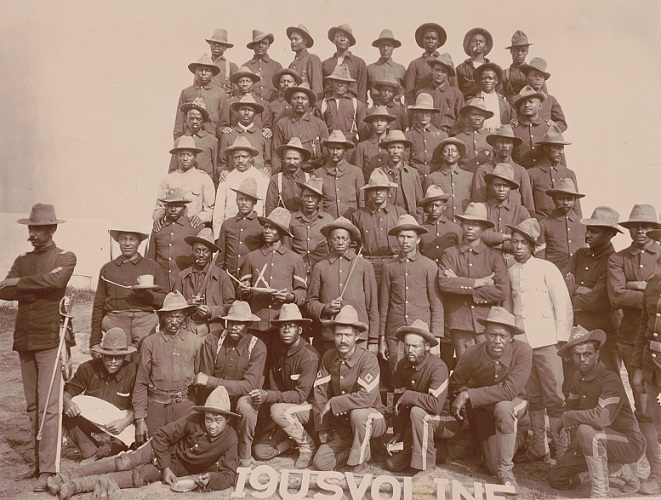


The following is a brief history of the 9th U.S. Volunteer Infantry, an African American Regiment, and an "immune" regiment that saw service in Cuba during the Spanish American War.
Unit History:
The 9th U.S. Volunteer Infantry was an African American regiment and was also termed an "immune" regiment, since it was believed that the men were "immune" to the tropical diseases which were decimating the American forces in Cuba by late July, 1898. The unit was mustered into service between June 18 and July 16, 1898 at New Orleans, Louisiana. At the time of muster-in, the unit consisted of 46 officers and 984 men. The regiment trained in New Orleans, Louisiana at Camp H. C. Corbin, located in that city's fairgrounds.
By late July, the U.S. forces in Cuba were being ravaged by a series of tropical diseases. Certain U.S. regiments were thought to be made up of men who were immune to these diseases for a variety of reasons. For instance, many thought that African American men were more immune to these diseases than were caucasian men (though there were also regiments of caucasian "immunes" also). With the forces in Cuba rapidly losing men to disease, the government attempted to remove the men who were currently there and replace then with "immune" troops. It was soon found out the theory on immunity was incorrect, and the "immune" regiments suffered from the same diseases as did the other troops.
On August 12, 1898, an armistice was declared between the United States and Spain, effectively ending the fighting, though the state of war still existed. On August 17, the 9th U.S. Volunteer Infantry sailed for Cuba aboard the transport BERLIN, arriving there five days later. Originally, the 1st U. S. Volunteer Infantry, an "immune" regiment of white troops departed from Camp Houston in New Orleans, Louisiana to proceed to Santiago, Cuba on August 17, 1898. But last minute directives replaced this regiment with the 9th U. S. Volunteer Infantry. Amid some protests among the men of the regiment, the 1st U. S. Volunteer Infantry unit returned to Galveston, Texas on the same day it had left.
The 9th U.S. Volunteer Infantry remained in Cuba until April 26, 1899, arriving back in the U.S. on April 30, 1899.
The unit was mustered out of service on May 25, 1899 at Camp Meade, in Middletown, Pennsylvania. At the time of muster out, the unit consisted on 46 officers and 869 men.
During its term of service, the unit lost 3 officers to disease, 16
officers resigned or discharged, and one officer dismissed. The unit
also lost 73 enlisted men to disease, one to an accident, and twelve
discharged on disability. In addition, twelve men deserted.
As a service to our readers, clicking on a title in red will take them to that book on Amazon.com
Casey, Powell, Encyclopedia of Forts, Named Camps, and Other Military Installations in Louisiana, 1700-1981. (Claitor's Publishing) 50.
"Colonel Riche's Immunes: They Break Camp This Morning and Start Home for Galveston," Galveston Daily News, August 18, 1898, page 1. (info. on BERLIN)
"Colonel Riche's Regiment Will Be Shipped to Santiago as Soon as Transports Can Be Secured," Galveston Daily News, August 5, 1898, page 1.
"Camp Houston: Colonel Riche Issues an Order Naming the Immune Camp," Galveston Daily News, August 5, 1898, page 1.
"Colonel Riche's Immunes: They Break Camp This Morning and Start Home for Galveston," Galveston Daily News, August 18, 1898, page 1.
Cosmas, Graham A., An Army for Empire : The United States Army in the Spanish American War. (Shippensburg, PA: White Mane Publishing Co., 1993). 126, 130, 131.
Statistical Exhibit of Strength of Volunteer Forces Called into Service During the War with Spain; with Losses from All Causes. (Washington: Government Printing Office, 1899).